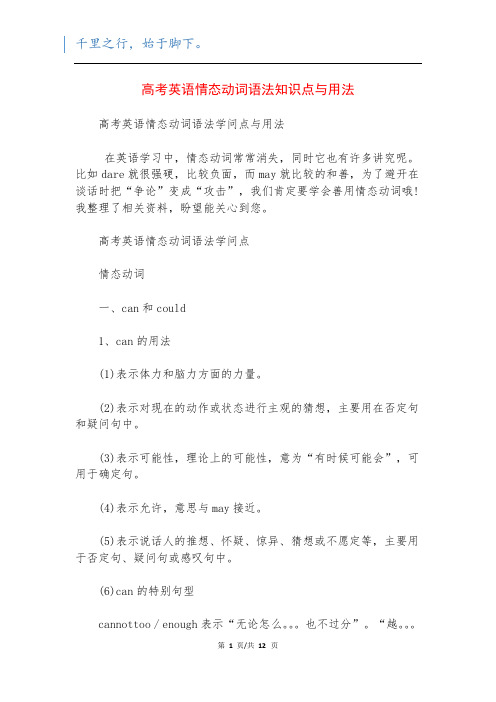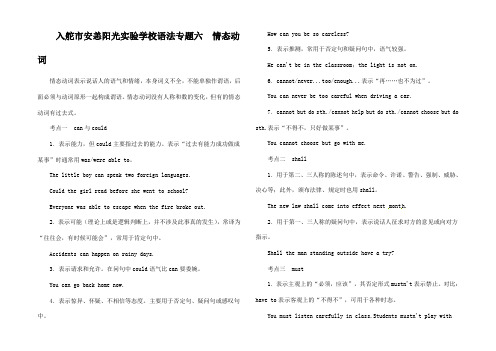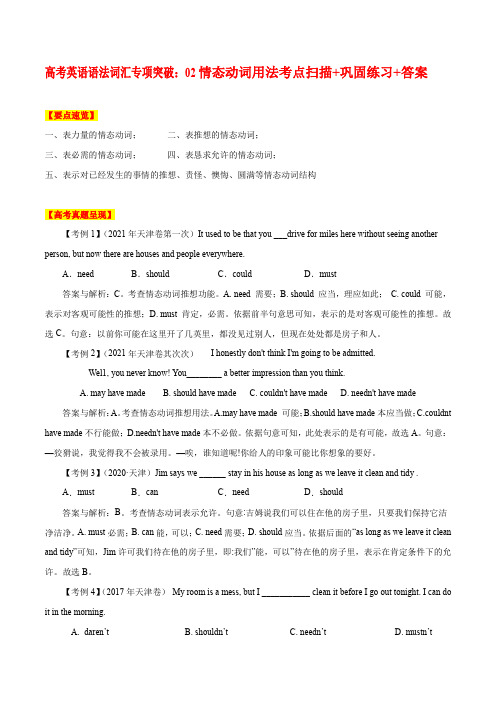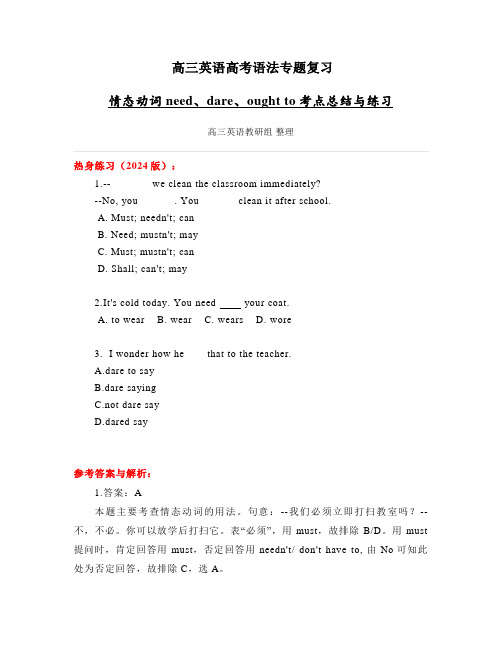高三英语语法-情态动词复习
高三复习+ 英语语法+情态动词和虚拟语气

情态动词和虚拟语气单句语法填空1.I wish I (be) a bird flying freely in the sky.2.A nna’s teacher suggested that she (learn) English by seeing English films.3.I t’s already 11:00 pm. The children be sleeping now.4.I f it (not rain) so heavily yesterday, we could have played soccer.5.—Will Peter come to tomorrow’s party?—He come but I’m not sure.6.M om insists that we (learn) to cook, for we are already 10 years old.7.T o be frank,I’d rather you (not say) those words to me.8.T he woman in the room be Miss White, for Miss White is much taller.9.I t is time that we (tell) Ms Smith the truth.10.M y sister play the piano when she was only seven; she does have a talent formusic.11.W ith the dress on, Ms Lin looks as if she (be) ten years younger.12.Y ou take the book out of the reading room but you can read it here.13.Y ou have set off earlier. If so, you would not miss the beginning of the movie.14.— I help you, madam?—Yes. I’d like a pair of sports shoes for teenage boys.15.I wish that you (come) yesterday. In that case, we could enjoy the party together.16.A s is known to all, without air or water, there be no living things.17.— I hand in the paper today?—No, you needn’t. The deadline is in two days.18.I f I fly, I would travel around the world and see all the beautiful things in theworld.19.T he boss demanded that the workers (finish) all the work before 6:00 pm.20.I f you (be) here a few minutes earlier,you wouldn’t have missed the wonderfulmoment.21.Y ou have done better during the competition, but you didn’t try your best.22.— you achieve great successes!—Thank you a lot!23.Y ou play basketball with us after school if you like.24.I remember the whole thing clearly as if it (happen) yesterday.25.“If only I (know) the answer to your question!” Jack said with regret.81参考答案1. were2. (should) learn3. must/should4. hadn’t rained5. may/might6. (should) learn7. hadn’t said8. can’t9. told/should tell10. could 11. were12. can’t/mustn’t13. should/ought to14. Can/May15. had come 16. would17. Must18. could19. (should) finish20. had been 21. could22. May23. can/could24. happened25. knew。
高考英语情态动词语法知识点与用法

高考英语情态动词语法知识点与用法高考英语情态动词语法学问点与用法在英语学习中,情态动词常常消失,同时它也有许多讲究呢。
比如dare就很强硬,比较负面,而may就比较的和善,为了避开在谈话时把“争论”变成“攻击”,我们肯定要学会善用情态动词哦!我整理了相关资料,盼望能关心到您。
高考英语情态动词语法学问点情态动词一、can和could1、can的用法(1)表示体力和脑力方面的力量。
(2)表示对现在的动作或状态进行主观的猜想,主要用在否定句和疑问句中。
(3)表示可能性,理论上的可能性,意为“有时候可能会”,可用于确定句。
(4)表示允许,意思与may接近。
(5)表示说话人的推想、怀疑、惊异、猜想或不愿定等,主要用于否定句、疑问句或感叹句中。
(6)can的特别句型cannottoo / enough表示“无论怎么。
也不过分”。
“越。
越好”。
cannot but+ do sth.表示“不得不,只好”。
2、could的用法(1)表示力量,指的是过去时间。
(2)表示允许,指的是过去时间。
(3)表示可能,可以指过去时间,也可以指现在时间,表示语气缓和。
(4)委婉客气地提出问题或陈述看法,指的是现在时间。
主要用于疑问句,回答时用can。
3、can与could的区分can表推想时只用于否定句和疑问句(could无此限制)。
couldnt 的可能性比cant小。
4、can与be able to的区分(1)现在时:无区分,但后者不常用。
(2)完成时;can没有完成时,此时要用have(has,had)been able to。
(3)将来时:can没有将来时,要用will be able to。
(4)过去时:could表示一般力量,was/were able to 表示在详细场合通过努力胜利做成某事的力量。
二、may 和might1、may的用法(1)表示询问或说明一件事可不行以做。
(2)表示一件事或许会发生或某种状况可能会存在,通常用在确定句和否定句中。
情态动词10条学习要点“could have 过去分词”用法全面归纳讲义 高考英语语法复习

2023年高中英语语法:情态动词10条学习要点“could+have+过去分词”用法全面归纳有关情态动词的10条学习要点1. 弄清基本语法特点情态动词就是表示说话的语气或情态的动词。
常见的情态动词有can, may, must, need, dare, shall, will, should, ought to, have to, used to, had better, would rather等。
情态动词具有以下3个特点:(1)情态动词后面接动词原形并与动词原形一起构成谓语。
(2)情态动词虽有时态的变化,但却没有人称和数的变化,即情态动词不会因为主语的人称或单复数的不同而用不同的形式。
(3)变为疑问句或否定句时不需要助动词,而是将情态动词移至主语前变为疑问句,直接在情态动词后加not,构成否定句。
2. 弄清表示能力的can / could和be able to的用法(1)can表示具有某种能力或技能,意为“能,会”。
如:Who can answer this question? 谁能回答这个问题?(2)can 的过去式为could,但它通常只表示过去一般性能力,不表示过去特定场合下的能力,遇此情况要用was [were] able to。
如:I could run faster then. 我那时能跑得更快一些。
They were able to jump into the sea before the boat was blown up. 他们在船爆之前跳入海里。
3. 弄清表示许可的can / could / may / might / must的用法can / could / may / might均可表示许可,只不过may较侧重讲话人的许可,而can较侧重客观情况的许可;could / might的语气比can / may更委婉、客气;在答语中表示允许别人做某事要can / may,不能用could / might。
情态动词高中知识点高三

情态动词高中知识点高三情态动词是一类具有特殊意义和用法的动词,它们在句子中一般与实义动词连用,表示说话人的推测、命令、请求、建议等情态。
在高中英语学习中,掌握情态动词的正确用法至关重要。
本文将介绍情态动词的相关知识点,帮助高三学生更好地运用这一语法现象。
一、情态动词的定义情态动词,又称情态助动词,是用来表示说话人对某种动作或状态的态度、推测、可能性、能力、意愿、义务等情态的一类特殊动词。
常见的情态动词包括can、could、may、might、must、shall、should、will、would等。
二、情态动词的用法1. 表示能力情态动词can表示某人具有能力或可能做某事,could用于过去说法。
例如:- She can speak three languages fluently.(她能说流利的三种语言)- He could lift the heavy boxes when he was younger.(他年轻时能搬起这些沉重的箱子)2. 表示推测和可能性情态动词may、might、could用于表示推测和可能性。
may用于表示较为肯定的推测,might和could表示推测的可能性较小。
例如:- The weather is cloudy, it may rain later.(天气多云,可能会下雨)- He might be late for the meeting.(他可能会迟到会议)3. 表示义务和建议情态动词must表示说话人对某种行为具有强烈的责任感或坚决要求,should表示建议。
例如:- We must obey the laws of the country.(我们必须遵守国家的法律)- You should apologize to your friend for your mistake.(你应该为你的错误向朋友道歉)4. 表示许可和请求情态动词can、may、could用于表示允许和请求。
高考英语新情态动词知识点

高考英语新情态动词知识点在高考英语中,情态动词一直是一个重要的语法知识点。
近年来,对于新情态动词的考查也逐渐增多。
新情态动词包括 ought to、have to、be supposed to 等,它们在用法和语义上都有其独特之处。
首先,我们来看看 ought to。
ought to 表示“应该”,语气比 should 稍强。
它常用于表示责任、义务或正确的做法。
例如:“You ought to study harder if you want to get good grades”(如果你想取得好成绩,你应该更努力学习。
)需要注意的是,ought to 的否定形式是 ought not to,疑问形式是将 ought 提前。
接着是 have to。
have to 强调由于外部的客观原因而“不得不”做某事。
它有人称、数和时态的变化。
比如:“I have to go now because it's getting late”(我现在得走了,因为天色已晚。
)“She had to stay athome yesterday because she was ill”(她昨天不得不待在家里,因为她生病了。
)与 must 不同,must 通常表示主观上的“必须”,而 have to 更侧重于客观上的无奈。
再来说说 be supposed to。
这个短语有多种含义,常见的有“应该;被期望”。
“You are supposed to arrive on time”(你应该准时到达。
)它还可以表示“本应;本该”,用来表示某事没有按照预期发生。
例如:“The train was supposed to leave at 9 o'clock, but it's delayed”(火车本该 9 点出发,但晚点了。
)在具体的语境中,这些新情态动词的运用需要我们仔细分辨。
比如,在表达建议时,ought to 可能更合适;在强调客观条件限制时,have to 更为准确;而 be supposed to 则在描述期望和规定方面用得较多。
高考英语一轮复习 语法专题 情态动词

入舵市安恙阳光实验学校语法专题六情态动词情态动词表示说话人的语气和情绪,本身词义不全,不能单独作谓语,后面必须与动词原形一起构成谓语。
情态动词没有人称和数的变化,但有的情态动词有过去式。
考点一can与could1.表示能力,但could主要指过去的能力。
表示“过去有能力成功做成某事”时通常用was/were able to。
The little boy can speak two foreign languages.Could the girl read before she went to school?Everyone was able to escape when the fire broke out.2.表示可能(理论上或是逻辑判断上,并不涉及此事真的发生),常译为“往往会,有时候可能会”,常用于肯定句中。
Accidents can happen on rainy days.3.表示请求和允许。
在问句中could语气比can要委婉。
You can go back home now.4.表示惊异、怀疑、不相信等态度。
主要用于否定句、疑问句或感叹句中。
How can you be so careless?5.表示推测,常用于否定句和疑问句中,语气较强。
He can't be in the classroom;the light is not on.6.cannot/never...too/enough...表示“再……也不为过”。
You can never be too careful when driving a car.7.cannot but do sth./cannot help but do sth./cannot choose but do sth.表示“不得不,只好做某事”。
You cannot choose but go with me.考点二shall1.用于第二、三人称的陈述句中,表示命令、许诺、警告、强制、威胁、决心等;此外,颁布法律、规定时也用shall。
高考英语语法词汇专项突破:02情态动词用法考点扫描+巩固练习+答案

高考英语语法词汇专项突破:02情态动词用法考点扫描+巩固练习+答案【要点速览】一、表力量的情态动词;二、表推想的情态动词;三、表必需的情态动词;四、表恳求允许的情态动词;五、表示对已经发生的事情的推想、责怪、懊悔、圆满等情态动词结构【高考真题呈现】【考例1】(2021年天津卷第一次)It used to be that you ___drive for miles here without seeing another person, but now there are houses and people everywhere.A.need B.should C.could D.must答案与解析:C。
考查情态动词推想功能。
A. need 需要;B. should 应当,理应如此;C. could 可能,表示对客观可能性的推想;D. must 肯定,必需。
依据前半句意思可知,表示的是对客观可能性的推想。
故选C。
句意:以前你可能在这里开了几英里,都没见过别人,但现在处处都是房子和人。
【考例2】(2021年天津卷其次次)---I honestly don't think I'm going to be admitted.---Wel1, you never know! You________ a better impression than you think.A. may have madeB. should have madeC. couldn't have madeD. needn't have made答案与解析:A。
考查情态动词推想用法。
A.may have made 可能;B.should have made本应当做;C.couldnt have made不行能做;D.needn't have made本不必做。
依据句意可知,此处表示的是有可能,故选A。
情态动词need、dare、ought+to考点总结讲义 高三英语高考语法专题复习

高三英语高考语法专题复习情态动词need、dare、ought to考点总结与练习高三英语教研组整理热身练习(2024版):1.--_______ we clean the classroom immediately?--No, you ______. You ______ clean it after school.A. Must; needn't; canB. Need; mustn't; mayC. Must; mustn't; canD. Shall; can't; may2.It's cold today. You need your coat.A. to wearB. wearC. wearsD. wore3. I wonder how he ___ that to the teacher.A.dare to sayB.dare sayingC.not dare sayD.dared say参考答案与解析:1.答案:A本题主要考查情态动词的用法。
句意:--我们必须立即打扫教室吗?--不,不必。
你可以放学后打扫它。
表“必须”,用must,故排除B/D。
用must 提问时,肯定回答用must,否定回答用needn't/ don't have to, 由No可知此处为否定回答,故排除C,选A。
2.答案:Aneed作实义动词时,后接不定式作宾语,need to do sth. 需要做某事,故选A。
3. 答案:Ddare既可作实义动词,也可做情态动词。
1)作实义动词时,其后既可接to,也可不接to.2) 做情态动词,后不接to,直接接动词原形A.dare to say 有to,这时dare是实义动词,因为主语是he,那么应该有人称或时态的变化,但是dare是原形,所以排除。
B. dare saying, dare后面不管加不加to都跟动词原形,所以排除。
- 1、下载文档前请自行甄别文档内容的完整性,平台不提供额外的编辑、内容补充、找答案等附加服务。
- 2、"仅部分预览"的文档,不可在线预览部分如存在完整性等问题,可反馈申请退款(可完整预览的文档不适用该条件!)。
- 3、如文档侵犯您的权益,请联系客服反馈,我们会尽快为您处理(人工客服工作时间:9:00-18:30)。
高三英语语法-情态动词复习情态动词具有一定的词义,没有人称和数的变化,不能单独充当谓语。
它和谓语动词连用,表示“请求,愿望,建议,推测”等意义。
第一节交际1.表示“请求”,请别人做事。
用will, would, can , could。
句型:(1)Will / Would you(please)do …?(2)Can / Could you do …?在这两个句型中would, could比will, can更正式、客气。
Will / Would you please explain the text once again ?Can / Could you tell me what time Flight 312 arrives?2.询问是否“许可”。
用can / could,may / might句型:(1)May / Might I do …? (2)Can / Could I do…? 在这两个句型中could, might比can, may更正式、客气。
—Could I use your car ?—Yes, of course, you can ?(回答必须用can)—Might I have a look at your new computer ?—Yes, you may(回答必须用may)或Please go ahead. 3.自己想做,要求对方做决定, 即征询对方意见。
用shall,用于第一人称和第三人称。
句型:Shall I(we, he, she it, they)…?译“要不要…?”—The room is so dirty. Shall we clean it?—Of course. (03全国春季)Shall these goods be sent over to you at once ? 要不要把这些货物马上送给你?4.表示规劝,建议1)正面的规劝,表示“最好”,“应该”,或“必须”做某事。
①表示“最好”,用had better,may / might as well或It is better / best to do sth.You might just as well tell the manufacturer that male customers may not like the design of the furniture. (04上海春季)If you are planning to spend your money having fun this week, better forget it—you’ve got some big bills coming. (04广东卷)(better forget it相当于You had better forget it.)②表示“有义务或有必要”,用should或ought to。
即“应该”。
If you see anything unusual, you should call the police.③用must 译:“必须”。
The guide required that all passengers must wear seat belts.导游要求所有旅客必须系安全带。
2)反面的规劝,表示“不必”,“不应当”,或“不许”做某事。
①表示“不必”,用needn’t 或don’t have to 。
--- I don't mind telling you what I know.--- You needn’t. I'm not asking you for it. (04江苏卷)You needn’t return / don’t have to return the book now. You can keep it till next week.②表示“不应该”,用shouldn’t 或oughtn’t to。
We shouldn’t throw cold water on them. 我们不应当给他们泼冷水。
③表示“不许”,用mustn’t。
You mustn’t smoke in class. 上课时不准吸烟。
→shouldn’t →mustn’t 语气逐步加强needn’t / don’t have to5.须区别或注意的情态动词1)can, could与be able to的区别a)表示能力时can和be able to可以互换使用I can / am able to speak English. She could / was able to read novels at ten.b)表示在过去某一特定场合下,一次性表现出来的能力,只能用was / were able to。
The fire spread through the hotel very quickly but everyoneget out.A.had to B.would C.could D.was able to(答案D)(97全国)2)shall用在主语是第二、第三人称的陈述句中,表示说话人给对方的许诺或命令。
Work hard and you shall be paid. 好好干,你会得到报酬的。
(许诺)You shall leave here at once. = You must leave here at once. (命令)shall也用于法律、法令或规章等正式文件中,表示义务或规定。
译“应,必须”。
The fine shall be paid in cash. 罚款应以现金交纳。
3)need和dare的用法。
改错:1)To become a member of this club, one need attend threemeeting and pay his fees regularly.A BC D2)We do need masses of young people who dare accept all kinds of challenges.A B C Da)need(需要),dare(敢于)可作行为动词用,句型need to do, dare to do。
也可作情态动词,但不能用在肯定句。
在肯定句中只能作行为动词使用,故第一题B错,need →needs to;第二题C错,accept →to acceptb)need,作情态动词用时,无人称变化。
need用于否定句和疑问句中;dare用于否定句、疑问句和条件句中。
You needn’t work so hard. →You don’t need to work so hard.—Need I go at once.Yes, you must. / No, you needn’t.to)touch Mary dare not touch the snake. →Mary doesn’t dare(the snake.Dare you walk through the forest at night ?If the enemy dare enter our country, we will fight against them to the end.如果敌人胆敢进入我国,我们就和他们战斗到底。
4)should的用法。
should除表示“应该”外,还可用于表示情感、意志等句中的that从句。
译“竟然、居然”。
例如:You can’t imagine that a well-behaved gentleman _____ be so rude to a lady.A. mightB. needC. shouldD. would (答案C)(01上海)第二节推测1.根据某一事实、现象推测可能发生的情况。
用must, may, might。
下表比较了三者表示推测肯定程度的差别,以及对不同情况推测的表达方式。
大可能性小对当前情况的推测对已发生情况推测对将来可能发生的情况must be be doing must have done 不能may be be doing may have done may domight be be doing might have done might do例:You must be tired. Go home and have a good rest. (对目前的推测)The light is on in the lab. Mr Li must still be doing experiments. (对目前的推测)Sorry I'm late. I might have turned off the alarm clock and gone back to sleep again.(对过去的推测)(2000北京春季)注:1)must表示推测仅用于对当前和已发生的情况,不能用于推测将来可能发生的事情。
must表示推测仅用于肯定句。
在否定句和疑问句中,必须用can / could取代must。
Mr Li can’t still be doing experiments at present.My English-Chinese dictionary has disappeared.Who___________ have taken it?A.should B.must C.could D.would 答案C (03上海春季)2)may / might可以用于推测将来可能发生的情况,既可用于肯定句,也可用于否定句,但不能用于疑问句。
在疑问句中,同样使用can / could。
例:1. —Is John coming by train?— He should, but he________not. He likes driving his car.A. mustB. canC. needD. may 答案D (02全国)2. — Your son may return to Nanjing tomorrow by way of Hong Kong.— Wonderful! But how can he come, by air or sea?2.根据经验或惯例对某一情况进行推测,用should或ought to,常译成“按理应该…”或“可能会……”。
It’s nearly seven o’clock. Jack should be here at any moment. 时间已将近7点了,按理Jack该回来了。
第三节反思1.表示“当时本应该做,而实际上没有做”,用:①should have done或ought to have done②could have done或might have done句型①责备的语气强于句型②例:1. Mr. White should have arrived at 8:30 for the meeting, but he didn’t’ show up.(04广西卷)2.He might have given you more help, even though he was busy. 2.表示“当时没有必要”做某事①needn’t have done 当时做了某事,但事实上没有必要You needn’t have told him the news; he knew it alre ady. didn’t have to do 通常指当时某事没有必要做且没有做。
